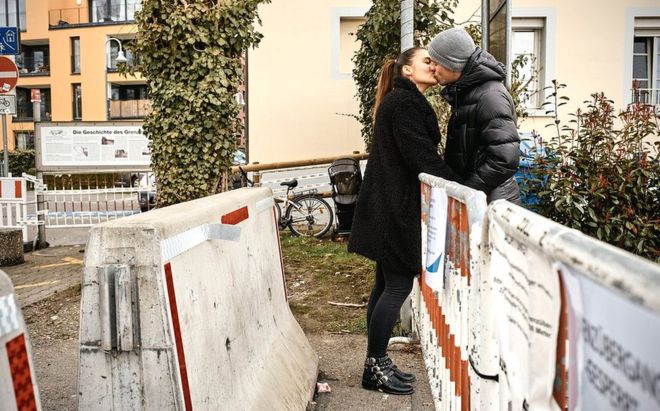Relaxed Swiss borders will reunite families and lovers
Neighbours Switzerland, Germany, and
Austria begin relaxing border restrictions this weekend, ahead of a
full reopening including France in mid-June.
The relaxation means friends, families and lovers divided by the border closures will be able to meet again. The four countries, all members of the Schengen open-border zone, shut their frontiers in March in a bid to control the spread of the coronavirus.
Road, rail, and air travel were halted.
Tens of thousands of people were turned away at borders. In Switzerland, only Swiss citizens, those with permanent work permits, and essential health workers were allowed entry.
Three months ago such restrictions were unimaginable. The 26 Schengen countries are used to seamless travel. Getting a train from Berlin to Basel, Geneva to Paris, or Vienna to Zurich was an everyday occurrence that everyone took for granted.
Who was hit by closures?
The restrictions have hit border communities particularly hard.In the "Basel Triangle" where Germany, France, and Switzerland meet, local businesses are interdependent, thousands of people cross the borders daily, to work, to meet friends and family, or to shop.
Why this reopening is important
At the start of May, as cases of the virus fell, Schengen governments began to discuss a reopening.No-one wanted to be first, but neither did one country want to keep its border closed if its neighbour opened theirs
The strategy was agreed: reopen the zone's internal borders, like those between Germany, France, Switzerland and Austria, in unison, in a cautious step-by-step process.
For the border towns of Constance in Germany and Kreuzlingen in Switzerland this weekend's relaxation is very important.
These towns have, over the years, become one. Short streets can be Switzerland at one end, and Germany at the other.
When a fence and barriers were erected to enforce the border closures, it caused dismay for many, and heartbreak for some.
Neighbourhoods were divided. Couples who lived on either side of the border found themselves separated. Different generations of the same family could no longer visit each other.
Instead they gathered at the fence, to talk and exchange news through the wire. The fence, later doubled to stop people kissing through it, soon became decorated with flowers, notes, and pictures of broken hearts.
Borders to stay closed for ordinary travellers
Now after intense lobbying in Berlin and Bern by mayors in the border regions, the borders will reopen for separated lovers and divided families. And people with allotments across the border will finally be able to tend them again.But for tourists, shoppers and the simply curious the frontiers stay closed.
Policing this arrangement will be tricky. Those wishing to cross from Switzerland to Germany have to fill out a form, explaining why they want to go and who they want to visit
Switzerland, France, Germany and Austria say they hope to reopen their borders with one another completely in mid-June. But only if cases of the coronavirus remain low.
It's not clear if that fence in Kreuzlingen will come down immediately. And the border with neighbouring Italy, hard hit in the pandemic, remains closed.
https://www.bbc.com/news/world-europe-52674205





Post a Comment